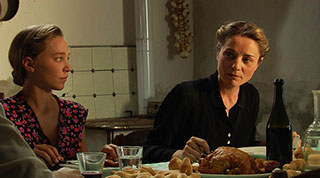Duck Hunter – The
 Thursday: 7:30 pm – Hendricks Art Center
Thursday: 7:30 pm – Hendricks Art Center
Friday: 6:30 pm – Franchesco’s
Friday: ADDED — 9:00 pm – Rotary Center
Saturday: 11:00 am – La Casa Grande
Sunday: ADDED — 5:00 pm – Domenico’s
 Category: Feature
Category: Feature
Genre: Drama
Country: Italy
Language: Italian with English Subtitles
Rating: PG-17
Runtime: 90 min.
Director: Egidio Veronesi
Producer: Egidio Veronesi
I wanted to tell a story about simple people. A story of pure fantasy, nothing autobiographical, nothing that happened in actual fact. With the exceptions of the painter Ligabue and the less known Tajadela, considered one of the best storytellers of northern Italy between the two wars. He’d perform with the accordion at the town festivals along with the blind clarinettist Nadir Bernini, singing ‘Vincere’ (To Win) while walking backwards. Occasionally he’d get beaten by the fascists for this. They were fascinating characters of whom I’ve heard stories from people that met them. I regarded them too interesting to leave them out of the plot of the film.
The fiction is set in the early 40’s and tells of four friends who live their dreams just like young people always did. In their countryside world they can still lead a normal life; the war seems far away and everyone lives the fascist age in a seemingly uninvolved way.
The poor lived in such a way, troubled by the needs of daily life. Up until when the course of History caught up with them, scarring them on their very flesh.
In this same way are the protagonists of the film: they live peacefully day-by-day, until the difficulties of life before and the coming of the war after alter their lives.
When writing the screenplay I especially wanted to avoid any form of rhetoric and any opinions regarding the historical and political events.
‘Il cacciatore di anatre’ is a film about life and feelings. Perhaps it’s soft, because it tackles a lot of topics without any special claims, except that it intends to depict the point of view of simple, but not shallow people, who know how to live bravely and decently.
It’s a work very far from the cliches of many movies, in which the countryside is made up of complaining and hopeless people, who just enjoy the village feast, dancing on the barnyard or waiting for the pork to be killed.
This film is a sort of epic of the rural world in the mid-twentieth century. And I’m sure the people who really lived those times and those places can only say: ‘we were just like that’!

